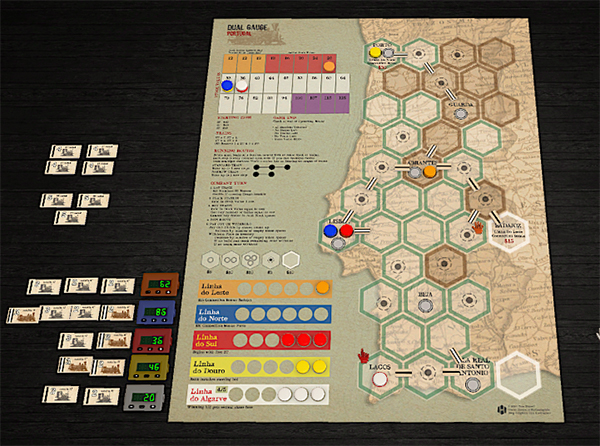Penny: Dual Gauge - Portugal
Most people in my normal gaming circle are train game people and I have heard a lot about this game leading up to its release. Coupling that group excitement with it being another weird Tom Russell train game and I was pumped to finally get a chance to play it. The game I am talking about, of course, is Hollandspiele’s Dual Gauge. The game also comes with two maps, one designed for beginners to the system and another with a bit more going on. All the other players in the group had some experience, but we played the beginner map (Portugal) since I was a newbie to the system.
I tend to like Tom’s games since they are strange and subvert normal train game expectations and structure. This is thankfully no exception. The train operations and the train roster itself are both notable examples of that. The trains run routes and eventually rust just like in other games, but that does not mean everything is the same. The trains get more expensive as the game goes on (2, then 3, then 4, etc), but they don’t run differently. An endgame 5-train is just as good as a 2-train when it comes to running routes (well, it is slightly better since it does not rust). Another neat facet of this game is like one that makes Paris Connection one of my favorite cube rail games. The company shares and tokens are represented by the same component, and companies have a limited number of them. This introduces some neat strategies and tradeoffs as the game goes on. Building a station reduces the potential number of shares players can hold, just like buying the last share from the charter means the company can no longer place stations.

That is not to say I walked away with universal praise for the game. I won the first share of the company in the south of this play (the white one, only in play with 4 or 5 players). That company played solitaire all alone in its region of the map. It was also running for revenues that were much lower than the companies in the middle of the map which were able to cooperate a bit more and accomplish some more profitable engineering. It was then a surprise to me when I wound up winning since it seemed strange to just be able to solitaire myself to a victory. Looking back, I think some of this is due to the company’s special power (getting an extra share when the first share is bought for free), as well as some of that mid-map cooperation turning sour in the last couple of rounds of the game. Regardless, I left the game feeling more excited about the game than disappointed by a longshot and interested to see if and how these various aspects play out future plays.
BGG Game Link: Dual Gauge